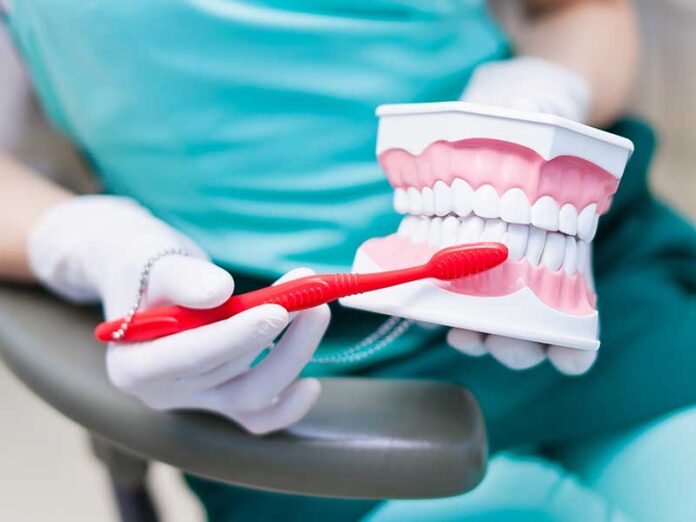When most of us brush and floss our teeth, we do so to prevent cavities from occurring. However, maintaining excellent oral hygiene is essential not only for your teeth but for your gum health. Poor gum health and disease have been linked to serious health concerns such as heart disease, stroke, and even dementia. That is why it is so important to visit your Yaletown dentist at least once every six months for a professional dental cleaning and exam.
What Causes Gum Disease?
Our mouths hold complex ecosystems of bacteria, both good and bad. When all these bacteria are properly balanced, the gums remain healthy and are protected from disease-causing bacteria. Disturbances at this balance allow harmful bacteria to take over, leading to gum disease.
These disturbances occur when one does not keep the harmful bacteria at bay through regular brushing and flossing and visits to a dentist in Vancouver. When these bacteria are allowed to linger, they harden into a substance called tartar, which leads to tooth decay, gum inflammation, and infection when left untreated.
How Does Gum Disease Affect the Body?
Some people are surprised to learn how serious gum disease can affect their bodies and overall health. The effects of the gum disease range from mild swelling and redness of the gums, also known as gingivitis, to the complete destruction of the gum and bone tissue surrounding the teeth- leading to tooth loss.
Over the years, research has shown that those with advanced periodontal disease are at a higher risk of cardiovascular complications, dementia, pregnancy issues, and respiratory diseases. While there is an association between the two, scientists still aren’t sure if this is a cause-and-effect relationship; however, it is clear that the inflammation that plays a role in all of these diseases is the link.
Options for Gum Disease Treatment
Depending on the severity of your gum disease, there are several options for gum disease treatment in Yaletown that may be presented to you.
Non-surgical treatment options include:
- Professional dental cleanings- if you have mild gum disease, your dentist will provide you with a professional cleaning to remove the buildup of plaque and tartar along your gum line. If you have early signs of gum disease, then you may need to visit your dentist every couple of months for a cleaning to ensure the disease does not progress.
- Scaling and root planing- if you have moderate gum disease, your dentist will perform a deep cleaning of your mouth while under local anesthesia. In this procedure, the plaque and tartar are scraped out from above and below the gum line. Additionally, they will smooth out the rough spots on your tooth roots to remove bacteria and allow the gums to easily reattach to the teeth.
In more severe cases, you may require surgical gum disease treatment near you, such as:
- Pocket reduction surgery- during this procedure, the gums are peeled back so our dentist can access and remove tartar. In certain cases, the rough surfaces of damaged bone will be smoothed down to limit the areas where dangerous bacteria can accumulate. The gums are then placed back down to allow the tissue to fit snugly around the tooth. By reducing the space between the tooth and gum, the areas where bacteria can hide are limited, and therefore the chances of developing a serious health issue are reduced.
- Guided tissue regeneration- this is performed when the bone that supports your teeth has been destroyed and works to stimulate bone and gum tissue growth. Usually done in combination with pocket reduction techniques, a small piece of fabric is inserted between the gum tissue and bone to keep the gum tissue from growing into the area where the bone needs to be.
Maintaining Gum Health at Home
The best way to maintain excellent gum health is to ensure that you follow an excellent oral hygiene routine of brushing and flossing each day. Additionally, ensure that you maintain a healthy, well-balanced diet and make good lifestyle choices such as abstaining from smoking. By doing all these things, you can look forward to a healthy mouth for years to come.


















